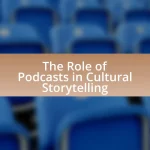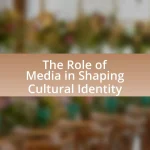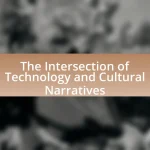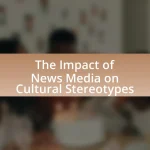Cultural theory plays a crucial role in shaping educational practices by influencing curriculum design, teaching methodologies, and assessment strategies. It emphasizes the significance of cultural context in learning, advocating for inclusive practices that acknowledge diverse student backgrounds. Key components of cultural theory, such as cultural identity, social context, and power dynamics, inform teaching methodologies and promote equitable learning environments. The article explores how understanding cultural context enhances student engagement and academic success, the implications for curriculum development, and strategies for educators to implement culturally responsive practices effectively. Additionally, it addresses the challenges of applying cultural theory in diverse classrooms and its relationship to educational equity.

What is the Impact of Cultural Theory on Educational Practices?
Cultural theory significantly influences educational practices by shaping curriculum design, teaching methodologies, and assessment strategies. It emphasizes the importance of cultural context in learning, advocating for inclusive practices that recognize diverse student backgrounds. For instance, research by Ladson-Billings (1994) highlights the effectiveness of culturally relevant pedagogy, which improves student engagement and academic success among marginalized groups. This approach fosters a learning environment that respects and incorporates students’ cultural identities, leading to better educational outcomes.
How does cultural theory influence educational frameworks?
Cultural theory significantly influences educational frameworks by shaping the values, beliefs, and practices that guide teaching and learning processes. This influence manifests through the incorporation of diverse cultural perspectives into curricula, which fosters inclusivity and relevance in education. For instance, educational frameworks that integrate cultural theory often emphasize critical pedagogy, encouraging students to engage with their cultural identities and societal contexts. Research by Ladson-Billings (1994) highlights that culturally relevant pedagogy enhances student engagement and academic success by connecting learning to students’ cultural backgrounds. Thus, cultural theory not only informs the content of educational frameworks but also affects pedagogical approaches, ultimately aiming to create equitable learning environments.
What are the key components of cultural theory in education?
The key components of cultural theory in education include cultural identity, social context, power dynamics, and the role of language. Cultural identity shapes how students perceive themselves and their learning experiences, influencing engagement and motivation. Social context refers to the environment in which education occurs, including community values and norms that affect educational practices. Power dynamics highlight the relationships between different cultural groups within educational settings, impacting access and equity. Lastly, the role of language is crucial as it serves as a medium for cultural expression and communication, affecting how knowledge is constructed and shared in educational contexts. These components collectively inform how cultural theory can enhance educational practices by promoting inclusivity and understanding among diverse student populations.
How do these components shape teaching methodologies?
Cultural components shape teaching methodologies by influencing the values, beliefs, and practices that educators adopt in their classrooms. For instance, cultural theory emphasizes the importance of context in learning, leading educators to tailor their approaches to reflect the diverse backgrounds of their students. This adaptability is supported by research indicating that culturally responsive teaching improves student engagement and achievement, as seen in studies like “Culturally Responsive Teaching: Theory, Research, and Practice” by Geneva Gay, which highlights the positive outcomes of integrating cultural relevance into pedagogy. Thus, the incorporation of cultural components directly informs and enhances teaching methodologies, making them more effective and inclusive.
Why is understanding cultural context important in education?
Understanding cultural context is important in education because it shapes students’ learning experiences and influences their engagement and success. Cultural context encompasses the values, beliefs, and practices that students bring to the classroom, which can affect their motivation, communication styles, and learning preferences. Research indicates that culturally responsive teaching, which acknowledges and incorporates students’ cultural backgrounds, leads to improved academic outcomes and fosters a more inclusive learning environment. For example, a study by Gay (2010) in “Culturally Responsive Teaching: Theory, Research, and Practice” demonstrates that students perform better when their cultural identities are recognized and valued in educational settings.
How does cultural context affect student engagement?
Cultural context significantly affects student engagement by shaping students’ motivations, values, and learning styles. For instance, students from collectivist cultures may prioritize group work and collaboration, leading to higher engagement in cooperative learning environments. Research by Hofstede (1980) indicates that cultural dimensions, such as individualism versus collectivism, influence how students interact in educational settings. Additionally, culturally relevant pedagogy, as discussed by Ladson-Billings (1994), enhances engagement by connecting learning materials to students’ cultural backgrounds, thereby fostering a sense of belonging and relevance. This alignment between cultural context and educational practices directly impacts students’ willingness to participate and invest in their learning experiences.
What role does cultural identity play in learning outcomes?
Cultural identity significantly influences learning outcomes by shaping students’ engagement, motivation, and understanding of content. When students see their cultural backgrounds reflected in the curriculum, they are more likely to connect with the material, leading to improved academic performance. Research indicates that culturally relevant pedagogy enhances students’ self-efficacy and fosters a sense of belonging, which are critical for effective learning. For instance, a study by Ladson-Billings (1994) demonstrated that students who engaged with culturally relevant teaching practices showed higher levels of academic achievement and participation. This evidence underscores the importance of integrating cultural identity into educational practices to optimize learning outcomes.
What are the implications of cultural theory for curriculum development?
Cultural theory significantly influences curriculum development by emphasizing the importance of cultural contexts in shaping educational content and practices. This approach encourages educators to integrate diverse cultural perspectives, ensuring that the curriculum is relevant and inclusive for all students. For instance, research by Banks and Banks (2010) highlights that culturally responsive curricula improve student engagement and achievement by reflecting the backgrounds and experiences of diverse learners. Additionally, cultural theory advocates for critical pedagogy, which promotes critical thinking and social justice, thereby preparing students to navigate and challenge societal norms. This alignment with cultural contexts not only enhances learning outcomes but also fosters a more equitable educational environment.
How can educators integrate cultural theory into lesson planning?
Educators can integrate cultural theory into lesson planning by incorporating diverse cultural perspectives and contexts into the curriculum. This approach allows educators to create lessons that reflect the varied backgrounds of students, fostering inclusivity and engagement. For instance, using culturally relevant materials, such as literature from different cultures or historical examples that resonate with students’ experiences, can enhance understanding and relevance. Research indicates that culturally responsive teaching improves student achievement and engagement, as highlighted in the work of Gloria Ladson-Billings, who emphasizes the importance of connecting academic content to students’ cultural contexts.
What are the challenges of applying cultural theory in diverse classrooms?
Applying cultural theory in diverse classrooms presents challenges such as differing cultural backgrounds, varying interpretations of cultural norms, and potential biases in curriculum design. These challenges arise because educators must navigate the complexities of integrating multiple cultural perspectives while ensuring that all students feel represented and valued. Research indicates that when cultural theory is not effectively applied, it can lead to misunderstandings and reinforce stereotypes, ultimately hindering student engagement and learning outcomes. For instance, a study by Ladson-Billings (1994) highlights that culturally relevant pedagogy is essential for fostering an inclusive environment, yet many educators struggle to implement it due to a lack of training and resources.
How does cultural theory relate to educational equity?
Cultural theory relates to educational equity by emphasizing the importance of understanding diverse cultural backgrounds in shaping educational practices and policies. This theory posits that recognizing and valuing cultural differences can lead to more equitable educational outcomes by addressing systemic biases and barriers faced by marginalized groups. For instance, research by Ladson-Billings (1995) highlights how culturally relevant pedagogy can improve engagement and achievement among students from diverse backgrounds, demonstrating that when education is tailored to reflect students’ cultural contexts, it fosters a more inclusive and equitable learning environment.
What strategies can be employed to promote equity through cultural understanding?
Strategies to promote equity through cultural understanding include implementing culturally responsive teaching, fostering inclusive curricula, and encouraging open dialogue about cultural differences. Culturally responsive teaching adapts educational practices to reflect the diverse cultural backgrounds of students, which has been shown to improve engagement and academic performance (Gay, 2010). Inclusive curricula that represent various cultures and perspectives help students see themselves in the material, promoting a sense of belonging and equity in the classroom (Ladson-Billings, 1994). Additionally, creating safe spaces for open dialogue allows students to share their cultural experiences and challenges, fostering mutual respect and understanding among peers, which is essential for an equitable educational environment.
How can cultural theory address systemic biases in education?
Cultural theory can address systemic biases in education by providing frameworks that analyze and challenge the underlying cultural narratives and power dynamics that perpetuate inequality. By examining how cultural norms and values shape educational policies and practices, cultural theory reveals the biases embedded in curricula, assessment methods, and teacher-student interactions. For instance, research by Ladson-Billings (2006) highlights how culturally relevant pedagogy can empower marginalized students by validating their cultural identities and experiences, thereby reducing systemic biases. This approach not only fosters inclusivity but also enhances academic engagement and achievement among diverse student populations.
What are the practical applications of cultural theory in educational settings?
Cultural theory has practical applications in educational settings by informing curriculum design, enhancing teaching strategies, and fostering inclusive environments. For instance, educators can utilize cultural theory to create curricula that reflect diverse cultural perspectives, thereby promoting critical thinking and engagement among students. Research indicates that culturally relevant pedagogy improves student achievement and motivation, as seen in the work of Gloria Ladson-Billings, who emphasizes the importance of connecting learning to students’ cultural contexts. Additionally, cultural theory aids in developing teaching strategies that accommodate various learning styles and backgrounds, which can lead to improved educational outcomes. By applying cultural theory, educators can also cultivate an inclusive atmosphere that respects and values diversity, ultimately contributing to a more equitable educational experience.
How can teachers assess the effectiveness of culturally responsive practices?
Teachers can assess the effectiveness of culturally responsive practices by utilizing student feedback, academic performance metrics, and classroom engagement observations. Student feedback can be gathered through surveys or discussions that focus on their experiences and perceptions of inclusivity and relevance in the curriculum. Academic performance metrics, such as grades and standardized test scores, can indicate whether culturally responsive practices are positively impacting learning outcomes. Additionally, observing classroom engagement, including participation levels and student interactions, provides insight into how well these practices resonate with diverse learners. Research shows that culturally responsive teaching can lead to improved student achievement and engagement, as evidenced by studies indicating that students from diverse backgrounds perform better in environments that acknowledge and incorporate their cultural contexts.
What resources are available for educators to learn about cultural theory?
Educators can access a variety of resources to learn about cultural theory, including academic journals, online courses, and books. Notable academic journals such as “Cultural Studies” and “Journal of Cultural Theory” publish peer-reviewed articles that explore various aspects of cultural theory. Online platforms like Coursera and edX offer courses on cultural studies and theory, often created by reputable universities. Additionally, foundational texts such as “Cultural Theory: An Introduction” by Andrew Edgar and Peter Sedgwick provide comprehensive insights into the subject. These resources are widely recognized in the field and serve as credible avenues for educators seeking to enhance their understanding of cultural theory.
What best practices can educators adopt to implement cultural theory effectively?
Educators can adopt several best practices to implement cultural theory effectively, including integrating diverse cultural perspectives into the curriculum, fostering an inclusive classroom environment, and encouraging critical discussions about cultural identities. By incorporating diverse cultural perspectives, educators can enhance students’ understanding of different worldviews, which is supported by research indicating that multicultural education improves student engagement and academic performance. Creating an inclusive classroom environment allows all students to feel valued and respected, which is essential for effective learning; studies show that inclusive practices lead to higher student satisfaction and retention rates. Additionally, encouraging critical discussions about cultural identities promotes awareness and empathy among students, aligning with findings that suggest dialogue about cultural differences fosters social cohesion and reduces prejudice.










